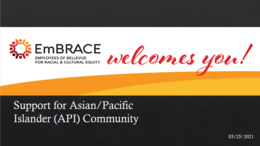Learn how to stop hate in your workplace, share messages of support and inclusion, and find organizations and resources that address the mental health of communities affected by hate and bias.
Workplace Resources
Here are some tips for managers/businesses in response to race-based incidents of hate affecting employees
Step 1: Acknowledge what is happening
- Acknowledge that the event took place.
- Research and educate yourself to know context.
- Share resources and information for those with questions.
- Take your time, don't breeze through the topic.
- If able, share your own feelings and model vulnerability when safe.
Step 2: Reduce work-related pressure
- Talk with employees about how they are doing.
- Reexamine work flow and necessary tasks, shifting deadlines if possible.
- Understand that while we are in a state of trauma response our neural functioning is not at its peak. (This can manifest in varying degrees of intensity, refer staff to HR if they need accommodation.)
Step 3: Make space for discussion
- A check-in, formal or informal, provides space to talk about recent events.
- A follow-up to the verbal acknowledgement (step 1).
- Hold space in a staff meeting for people to share their responses.
- Connect the information back to the work only after allowing individuals to express their own feelings.
Step 4: Support employees holistically
- This may mean supporting employees in their work duties but also in their wellbeing.
- Provide resources from internal and external sources: It is best practice to remind all employees that resources are available from a variety of sources.
- Check in again, these events can preoccupy an employee's mind for weeks or months after the incident.
Credit: Marika Sitz
Internal communication examples
Presentation from City of Bellevue Employee Resource Group that held a courageous conversation in support of Asian and Pacific Islander staff members, March 25, 2021
Message to City of Bellevue staff from City Manager Brad Miyake to address the topic of standing together against hate in the community and workplace, March 19, 2021
Mental Health Resources
Asian Pacific Islander mental health resources
National Alliance on Mental Illness - View the NAMI statement on AAPI violence and visit nami.org/AAPI for mental health resources for the API community.
You can also call the NAMI Helpline at 800-950-NAMI
Or in a crisis, text "NAMI" to 741741 to speak with someone right away.
我們的服務是免費和保密的。你可以用中文打電話給我們。
免費求助熱線 1-877-922-4292
星期一至星期五
上午十時正至下午四時正(太平洋標準時間)
Ang aming mga serbisyo ay libre at kompidensyal. Pwede kang tumawag at kausapin kami sa wikang Tagalog.
Libreng tawag sa Helpline 1-877-922-4292
Mula Lunes hanggang Biyernes
Umpisa ng alas-10:00 ng umaga hanggang alas-4:00 ng hapon (sona ng Pasipikong oras) (Pacific time)
हमारी सेवाएं मुफ्त और गोपनीय हैं। आप हमें हिंदी में कॉल कर सकते हैं l
टोल फ्री हेल्पलाइन 1-877-922-4292
सोमवार से शुक्रवार
10 बजे से शाम 4 बजे PST (प्रशांत मानक समय)
Các dịch vụ miễn phí và kín đáo. Quý vị có thể gọi và nói tiếng Việt.
Đường dây trợ giúp miễn phí 1-877-922-4292
Thứ Hai - Thứ Sáu
10 giờ sáng - 4 giờ chiều (múi giờ Thái Bình Dương)
支援・相談は無料。
ご相談内容は秘密厳守されます。
日本語でお問い合わせ下さい。
無料通話ヘルプライン 1-877-922-4292
月曜〜金曜
午前10時〜午後4時(太平洋標準時)
Other BIPOC mental health resources
National Alliance on Mental Illness - Visit NAMI pages for Black/African American, Indigenous, and Hispanic/Latinx (Español) communities to find culturally specific mental health resources and information.
You can also call the NAMI Helpline at 800-950-NAMI
Or in a crisis, text "NAMI" to 741741 to speak with someone right away.
Local Organizations Helping Asian Pacific Islander Communities
- Asian Pacific Islanders Coalition Advocating Together for Health (APICAT)
- Korean Women’s Association (KWA)
- API Chaya (Survivor Support Resources focused on survivors of gender-based violence and human trafficking), 1-877-922-4292
- Washington Anti-Trafficking Response Network Victim Assistance Line, 206-245-0782

